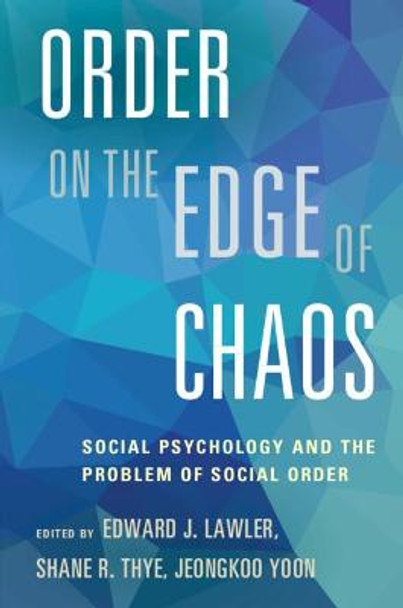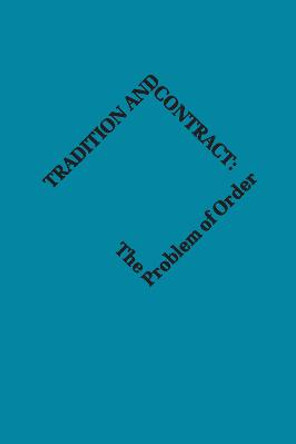Description
Order on the Edge of Chaos answers the question: how do people today create and sustain order in their lives and in their groups?
About the Author
Edward J. Lawler is the Martin P. Catherwood Professor of Industrial and Labor Relations and Professor of Sociology at Cornell University, New York. He has co-authored three books and edited or co-edited thirty-one volumes in the annual series, Advances in Group Processes. In 2001, he received the Cooley-Mead Award for career achievement from the Social Psychology Section of the American Sociological Association, and in 2003 his paper, 'An Affect Theory of Social Exchange' won the 2002 Theory Prize from the Theory Section of the American Sociological Association. His book (co-authored with Shane Thye and Jeongkoo Yoon), Social Commitments in a Depersonalized World (2009), won the 2010 James Coleman Best Book Award from the Rationality and Society Section of the American Sociological Association. Shane Thye is a Professor of Sociology at the University of South Carolina. He is the series co-editor (with Edward J. Lawler) of Advances in Group Processes. He recently completed Social Commitments in a Depersonalized World (2009) with Lawler and Yoon. He works primarily in the areas of group dynamics and experimental sociology. His work has appeared in outlets such as the American Sociological Review, the American Journal of Sociology, and Social Forces. Jeongkoo Yoon is Professor in the School of Management at Ewha Womans University, South Korea. His research applies power and exchange theories to solve issues of contemporary organizations such as empowerment, leadership, and change. He coauthored the book Social Commitments in a Depersonalized World (2009) with Lawler and Thye. He also published two award-winning best seller books in Korea, Change Management for 100 Year Sustainable Companies (2010) and What Is Authenticity? (2012). He served as Editor of the Korean Journal of Management and Chair of the Korean Association of Leadership. He is currently on the editorial board of the British Journal of Management.
Reviews
'Too often, the deep social theory questions that sit at the root of classical social theory are ignored by rigorous contemporary scientific theory that is focused primarily on solving practical middle-range problems. Thankfully, this book bucks that trend and collects careful and clear theorizing on the relation between social action and social order. The works collected here represent the very best of contemporary sociological social psychology, deeply motivated by the fundamental question of social order. The results speak to questions of power, identity, stability, meaning, morals, and more. The work will be a key resource for students in social theory courses and professional sociologists seeking to answer big questions in a rigorous manner.' James Moody, Robert O. Keohane Professor of Sociology, Duke University, North Carolina
'In fifteen chapters (plus introduction), today's leading social psychologists and theorists focus their expertise on a crucial question: How is social order possible in our complex, diverse societies? The chapters describe a variety of ways, many of which are not obvious, that interactions create and perpetuate beneficial or injurious social structures and institutions. Interactions carve patterns from the infinite possibilities for action and structure, and understanding the principles governing interactions allows for a measure of control over the outcomes.' Murray Webster, University of North Carolina, Charlotte
'This collection tackles a fundamental issue in the analysis of human behavior: How is order established and maintained? While many have addressed this issue at the macro-level, the micro-level is often neglected or even ignored. But in exciting, yet nuanced, fashion, each of these eminent scholars convincingly demonstrates the microfoundations of order or disorder. In doing so, they highlight the importance of individual choice and the enormous power of social relations and networks.' Jane Sell, Texas A & M University
'Order on the Edge of Chaos represents a compendium of microsociological solutions to the Hobbesian problem of social order. In it, many of the world's top sociologists make their case for why their theoretical dynamic, or phenomenon of interest, is critical to understanding social organization from the bottom up. The result is a fascinating tournament for theoretical primacy and substantive significance. A must-read, relevant to sociologists of all persuasions.' Robb Willer, Stanford University, California
'... the compilation offers a wide range of alternative and sometimes complementary frameworks, concepts, and processes for guiding scholars in explorations of the links that bond the individual to the social.' Choice
Book Information
ISBN 9781107433977
Author Edward J. Lawler
Format Paperback
Page Count 342
Imprint Cambridge University Press
Publisher Cambridge University Press
Weight(grams) 500g
Dimensions(mm) 229mm * 152mm * 19mm








